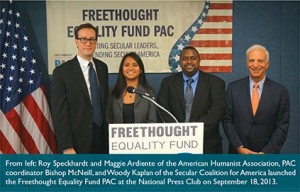Belief in the Almighty Dollar: Why We Need an Atheist PAC
I have a dream that one day Americans will judge their candidates on the content of their character and their political positions, rather than on their professed religious beliefs. I have a dream that one day we will have an electorate that doesn’t much care about the private religious views of elected officials, and that politicians won’t make their religious beliefs part of their public campaigns. I have a dream that one day candidates will have the political courage to say that questions about religion are none of the public’s business. However, my dreams might be more difficult to achieve than those of Martin Luther King Jr.
Ideally, whether someone is a Christian, a Muslim, a Jew, or an atheist shouldn’t matter. The important question to ask candidates is if and how their faith would impact their stands on public policy. If a candidate says it would have no effect, then we should just move on to political issues. Whether a politician is religious or not, I expect to hear good rational arguments for supporting an action. Perhaps I expect too much.
Though an atheist, I almost always vote for a professed Christian, not because I’m impressed by their declared God beliefs, but because I usually have no other choice—unless I vote for a third party or write-in candidate who has no chance of winning, and even they are probably religious believers. So if I can find Christians who support evidence-based policy and view the scientific method as an important criterion for drawing conclusions, I vote for them. We have fewer such politicians in my home state of South Carolina than politicians who would like to see “creation science” taught in public school science classes. Whenever a politician claims that God or the Bible tells him how to vote on an issue and what should become public policy, I know he is deluded, and deluded people can’t be counted on to make rational decisions.
We showed how diverse the United States could be when we elected a black Christian as president instead of the usual white Christian. Obama was once an agnostic, but became a Christian in time to run for public office. My South Carolina Governor Nikki Haley was raised a Sikh, but became a Christian in time to enter politics. In her gubernatorial campaign, her website first said, “I believe in the power and grace of Almighty God.” Apparently, that wasn’t good enough for voters and she changed it to, “My faith in Christ has a profound impact on my daily life and I look to Him for guidance with every decision I make.” I suspect that both Obama and Haley are what I call “political Christians,” those who decide to accept the idea that an unwritten requirement for public office is to profess deeply held Christian beliefs.
What can we do when so many politicians feel they must pretend to be religious in order to please an electorate that distrusts atheists?
 The good news for atheists, agnostics, humanists, and all secular Americans is the creation of the Freethought Equality Fund, a Political Action Committee (PAC) dedicated to expanding voters’ choices by backing the candidacy of open nontheists to public office. The PAC will support candidates who share our goals of protecting the separation of religion and government and defending the civil liberties of secular Americans.
The good news for atheists, agnostics, humanists, and all secular Americans is the creation of the Freethought Equality Fund, a Political Action Committee (PAC) dedicated to expanding voters’ choices by backing the candidacy of open nontheists to public office. The PAC will support candidates who share our goals of protecting the separation of religion and government and defending the civil liberties of secular Americans.
But the PAC is not designed to support all open atheists or to withhold support from all religious people. It will support some theists and “closeted” atheists who advocate for our causes. Before issuing an endorsement, the PAC will question viable candidates about their personal and political views on issues where religious belief could influence public policy. Besides advocating for a more secular government, the PAC hopes to dispel the bigoted notion that atheists are “immoral” and lack values. When people see respected atheists and humanists serving in public office, these stereotypes will change. Though atheists and humanists don’t believe in an almighty deity, we do believe in the almighty dollar. We’ve seen evidence of its power and influence in the political process, so it’s not beyond belief.
We have learned from the success of EMILY’s List, a PAC founded in the mid-1980s to help increase representation by women candidates who share the list’s views. We have also learned from the LGBT movement that the most effective way to change public perception is to come out of the closet. Attitudes toward gays changed rapidly when people realized that their friends, neighbors, family members, and even famous people were gay. And so it can be with atheists, including politicians who would like to benefit from our PAC. Interestingly, Congressman Barney Frank came out as gay more than thirty years ago, but didn’t come out as an atheist until he left office.
I’m hoping, but not praying, that someday we will regularly elect acknowledged atheists and humanists to public office, and that the public will be more interested in a candidate’s political ideology than professed theology. Should that day come, the Freethought Equality Fund can happily close their doors, go out of business and declare, “Mission Accomplished.”
